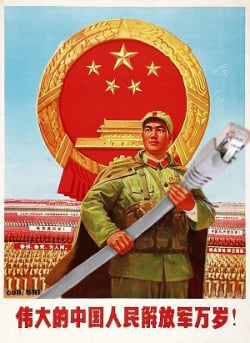There's a slew of one-time U.S. politicians and officials who have lobbied for China or whose business interests are closely connected to it.
BETHANY ALLEN-EBRAHIMIAN
As China’s wealth has grown, so has its sophistication at currying favor in Washington and among the American elite.
Both the Chinese government and Chinese companies, often with close state ties, have retained lobbying and public-relations firms in the Beltway, in some cases hiring former U.S. officials as personal lobbyists.
Beijing has also learned how to harness its economic might by alternately opening its doors to companies who play by China’s rules, and
slamming the door on companies that go against its red lines.
In some cases, this grants Beijing powerful sway over foreign companies with business interests in China.
This has raised concerns that
current U.S. government officials may have an eye on their future prospects in China even before leaving office.
While it may seem politics as usual in Washington today, some are alarmed.
“Nobody in the 1980s would have represented the Russian government. And now you find so many lobbying for the Chinese government,” said
Frank Wolf, a retired U.S. representative from Virginia who long served as the co-chairman of the Tom Lantos Human Rights Commission.
“I served in Congress for 34 years. I find it shocking.”
Below are some of the more prominent former U.S. politicians and officials whose have lobbied for China or whose business interests are closely connected to it.
1.
Charles Boustany
Boustany served as the U.S. representative for Louisiana’s 3rd Congressional District until 2017 and co-chaired the U.S.-China working group.
After leaving Congress, he joined the lobbying firm
Capitol Counsel.
Boustany has registered as a
foreign agent under the Foreign Agents Registration Act, representing the U.S.-China Transpacific Foundation, which is based in Las Vegas and is sponsored by the Chinese government.
According to FARA
filings, Capitol Counsel helps the foundation bring delegations of U.S. members of Congress to China to “enhance their understanding on the cultural, economic, political, and social developments of the People’s Republic of China, thus helping strengthen U.S.-China relations.”
The foundation provided Capitol Counsel with an initial fee of $50,000 in late 2017, when the contract began.
2.
John Boehner
The former House speaker joined Squire Patton Boggs after he retired from the House in 2015.
The lobbying firm has long represented the Chinese embassy in Washington; Boehner
serves “as a strategic adviser to clients in the U.S. and abroad, and will focus on global business development.”
Boehner helped lead the effort to grant China most favored trading nation status in the late 1990s.
3.
Jon Christenson
Christenson served as a U.S. representative from Nebraska from 1995 to 1999.
Chinese telecom giant
ZTE Corp hired him as a lobbyist after he left Congress.
After the FBI investigation into ZTE’s violation of sanctions on Iran became public, Christenson
resigned from his position there.
4.
David Firestein
Firestein served as a career diplomat from 1992 to 2010.
After leaving government, he joined the East-West Institute, where he spearheaded a series of
dialogues between high-ranking political party leaders in the United States and China.
In many of its dialogues, which bring U.S. leaders to China, the East-West Institute has
partnered with the
China-U.S. Exchange Foundation, which is closely connected to the United Front, a political-influence arm of the Chinese Communist Party; the institute has also partnered with a Chinese
organization known to be
a front for the People’s Liberation Army’s political-intelligence agency.
Firestein now serves as the director of the University of Texas at Austin’s China Public Policy Center. Firestein
proposed forming a partnership between the China Public Policy Center and the China-U.S. Exchange Foundation.
But under pressure from U.S. lawmakers concerned about Chinese influence, UT Austin decided to turn down the proposal this year.
5.
Mike Holtzman
Holtzman worked in the executive office of the president as special adviser for public affairs to the U.S. trade ambassador under
Bill Clinton, and later served as an adviser to the director of policy planning staff at the State Department under
Colin Powell.
Holtzman is now a partner at public-relations firm BLF Worldwide, where he managed the campaign for China’s bid to host the 2008 Olympics.
Holtzman is registered as a
foreign agent and represents the China-U.S. Exchange Foundation.
According to FARA
filings, in this role he will “provide services for the China-U.S. Exchange Foundation to promote its interests in the U.S., including expanding third-party supporters, generating media placements, arranging visits for delegations to China, and supporting CUSEF activity with the U.S.”
6.
Randall Phillips
Phillips spent 28 years in the CIA, finishing his tenure as
station chief in Beijing.
But after he left the agency, Phillips took the unusual step of remaining in Beijing and
joining the private-investigations firm Mintz Group.
Multiple sources told
The Daily Beast that
Phillips’ decision to peddle his services in Beijing has raised eyebrows within the agency.
7.
Donald (Andy) Purdy Jr.
As a White House staff member in the
George W. Bush administration, Purdy helped draft a cybersecurity strategy in 2003 known as the U.S. National Strategy to Secure Cyberspace before moving to the Department of Homeland Security, where he helped craft cybersecurity initiatives and served as the lead cyber- official at DHS and the U.S. government; he later
became the chief security officer for
Huawei’s U.S. operations.
8.
Clark T. Randt Jr.
Randt served as U.S. ambassador to China from 2001 to 2009.
Since 2009, he has served as president of Randt and Co. LLC, which advises companies doing business in China.
He is a special adviser of HOPU Jinghua (Beijing) Investment Consultancy Co., and sits on the
advisory boards of numerous organizations with business interests closely tied to China, including Qualcomm, Wynn Resorts, and Valmont Industries.
9.
Matt Salmon
Salmon served as U.S. representative for Arizona’s 5th Congressional District and chaired the Asia and the Pacific Subcommittee on the House Foreign Relations Committee.
He retired from politics in 2016.
He now serves as the vice president for government affairs at Arizona State University, where his position includes “working with the governments of other countries to advance international projects.”
Arizona State is home to a Confucius Institute, a Beijing-funded "educational" enterprise that Salmon has said brings around $200,000 a year to the university.
At an April event in Washington, co-hosted by the Confucius Institute as it faced congressional
scrutiny over threats to academic freedom on U.S. campuses, Salmon dismissed rising concerns about China as “McCarthyism” and said that the United States should work “with the only other superpower and not against it.”
10.
James D. Wolfensohn
A former president of the World Bank Group, Wolfensohn has
served as a member of the international advisory committee of the China Investment Corporation, China’s sovereign wealth fund.





